-
Long-haired Rottweilers are purebred Rottweilers: They simply carry a recessive gene that gives them a longer, softer coat.
-
They have amazing personalities: Loyal, affectionate, intelligent, playful, and protective, these dogs make wonderful companions.
-
Grooming is key: Their luxurious coat requires regular brushing to prevent mats and tangles.
-
Exercise and training are essential: Keep your Rottie happy and healthy with daily exercise, mental stimulation, and consistent training.
Understanding the Long-Haired Rottweiler
So, What Exactly Is a Long-Haired Rottweiler?
Long-haired Rottweilers are like the Clark Kent of the dog world – they have a secret identity! Beneath that tough, guardian exterior lies a hidden superpower: a recessive gene that gives them a longer, softer coat. Think of it as their “kryptonite for cuddles” – it’s irresistible! This sometimes makes people wonder if they’re a different breed altogether, but don’t worry, they’re 100% purebred Rottweiler.

The American Kennel Club (AKC) might not officially recognize them in their breed standard (more on that later!), but that doesn’t make them any less awesome. In fact, some Rottweiler enthusiasts believe the long-haired gene is a throwback to the breed’s early days when longer coats were more common. So, in a way, these fluffy pups are like living history!
They’re still the same loyal, loving, and intelligent dogs we all know and admire, just with a bit more to love (literally!). And who doesn’t love a bit of extra fluff?
A Looker with a Luxurious Coat
The most obvious thing about these dogs is, of course, their fabulous fur! It’s longer and softer than the typical Rottweiler coat, often with a bit of a wave or curl. But they still rock the classic Rottweiler colors: black with those adorable tan markings on their face, chest, and legs – like a perfectly tailored tuxedo with a touch of whimsy.

And don’t let the fluff fool you, these dogs are just as strong and muscular as their short-haired counterparts. They were originally bred to herd cattle and pull carts, so they’ve got the brawn to back up their beauty.
- Males: Typically stand 24-28 inches tall and weigh between 115-135 pounds.
- Females: A bit smaller, standing 22-26 inches tall and weighing 85-115 pounds.
(Source: American Rottweiler Club AKC)
-
Fun Fact: That luxurious long coat isn't just for show! It actually provides extra insulation, helping to keep them warm in colder climates. So, if you live in a place where winter likes to overstay its welcome, a long-haired Rottie might be the perfect snuggle buddy.
Personality Plus: Temperament and All That Jazz
Long-haired Rottweilers have the same amazing personality as their short-haired counterparts. They’re basically big teddy bears with a protective streak – the best of both worlds! Here’s the lowdown on their awesome temperament:
Loyal: These dogs are the epitome of “man’s best friend.” They’re incredibly devoted to their families and will stick by your side through thick and thin, whether you’re conquering Mount Everest or just chilling on the couch with a good book. (Source: American Rottweiler Club) My own Rottie, Max, follows me everywhere – even to the bathroom! Talk about dedication!
- Affectionate: Get ready for a whole lotta love! Long-haired Rottweilers are cuddle monsters who love to show their affection. They’ll shower you with kisses, lean against you for support (literally!), and follow you from room to room just to be near you. Imagine a furry shadow with the softest fur imaginable – that’s what you get with these guys.
- Intelligent: These dogs are sharp as a tack! They’re quick learners, which makes training a breeze (most of the time!). They thrive on mental stimulation and enjoy learning new things, so get ready for some fun training sessions. (Source: The Rottweiler Handbook by Joan H. Walker) Puzzle toys? Bring ’em on! Obedience training? They’ll ace it in no time.
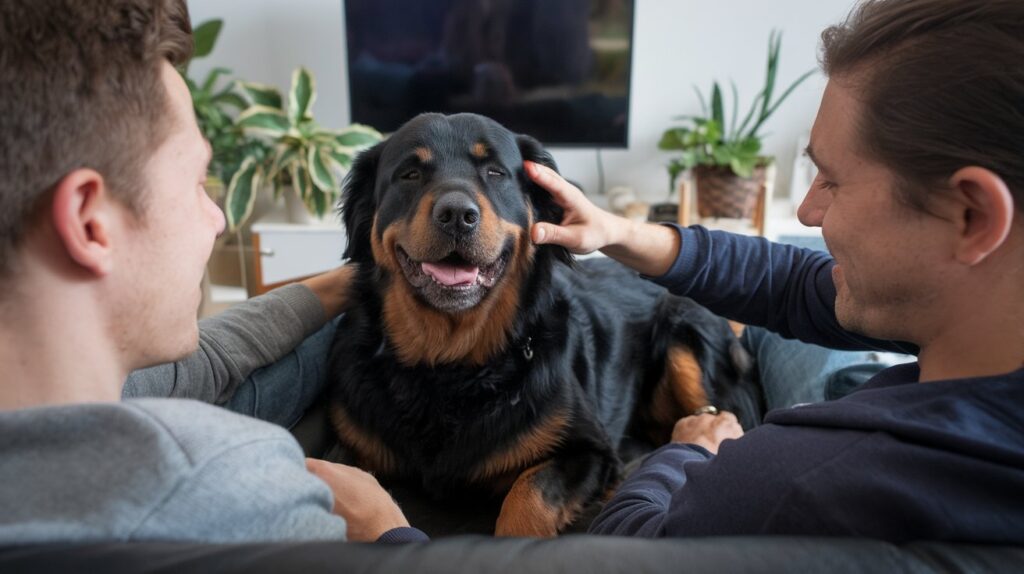
Loyal and affectionate, long-haired Rottweilers make wonderful family companions. - Playful: Don’t let their serious expression fool you, these dogs have a playful side too! They love to romp around, play fetch, and even participate in dog sports. Their playful nature makes them great companions for active individuals and families. Just be prepared for some epic games of tug-of-war!
- Protective: Rottweilers have a natural instinct to protect their loved ones. While this doesn’t mean they’re aggressive, they will be watchful and alert, always ready to step in if they sense danger. This protective nature makes them excellent guard dogs, but it also means early socialization is crucial to ensure they can distinguish between real threats and friendly faces. Think of them as your furry security system – always on duty!
Now, Rottweilers sometimes get a bad rap for being aggressive, but that’s simply not true. With proper socialization and training, they’re the biggest sweethearts you’ll ever meet. Some people even say that the long-haired ones are a bit gentler, but that’s just anecdotal evidence, not scientific fact. Either way, you’re guaranteed a loving and devoted companion.
-
Did you know? Rottweilers were originally bred in Germany to herd cattle and pull carts. Their name even comes from the German town of Rottweil! So, those protective instincts are deeply ingrained in their DNA.
Caring for Your Fluffball
Grooming: Taming the Mane Event
That gorgeous long coat is one of the things that makes long-haired Rottweilers so unique, but it also means you’ll need to put in a bit of extra effort to keep it looking its best. Think of it as a small price to pay for all that fluffiness! Here’s the lowdown on keeping your Rottie looking like a million bucks:
Brushing: Regular brushing is key to prevent mats and tangles. Aim for a few times a week, and more often when they’re shedding (because, yes, even those luscious locks shed!). A slicker brush and an undercoat rake are your best friends here. Think of it as a spa day for your furry friend – they’ll love the attention!
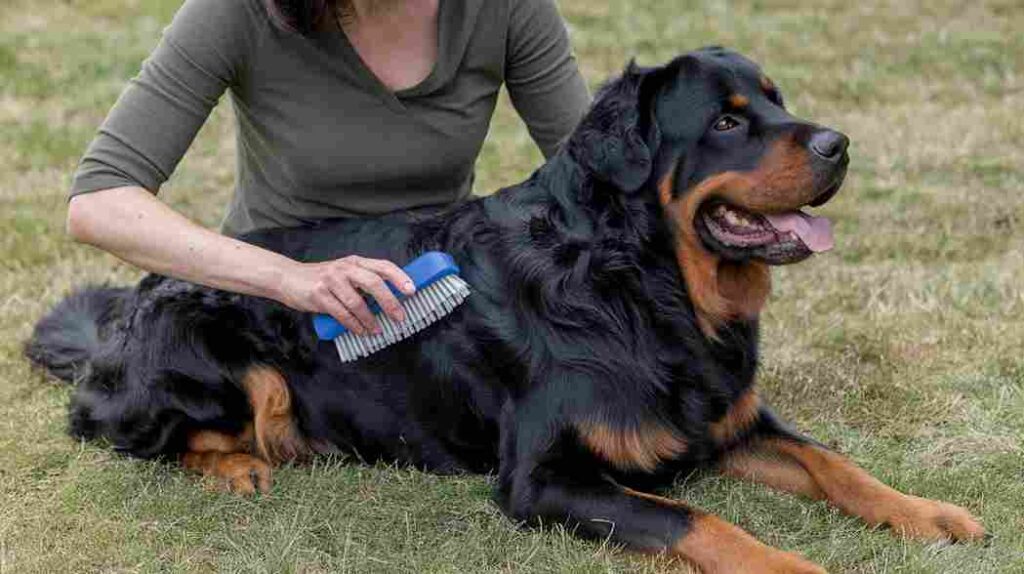
Bathing: Only bathe your Rottie when they really need it, using a dog-specific shampoo. Over-bathing can strip their coat of natural oils, leaving it dry and dull. Nobody wants a sad, lackluster coat!
Nails and Ears: Keep those nails trimmed and ears clean to avoid any issues. If you’re not comfortable trimming your dog’s nails yourself, ask your vet or a groomer to show you the proper technique. And don’t forget those floppy ears! Regular cleaning can prevent infections and keep your Rottie smelling fresh.
Exercise and Training: Ready to Play (and Learn!)
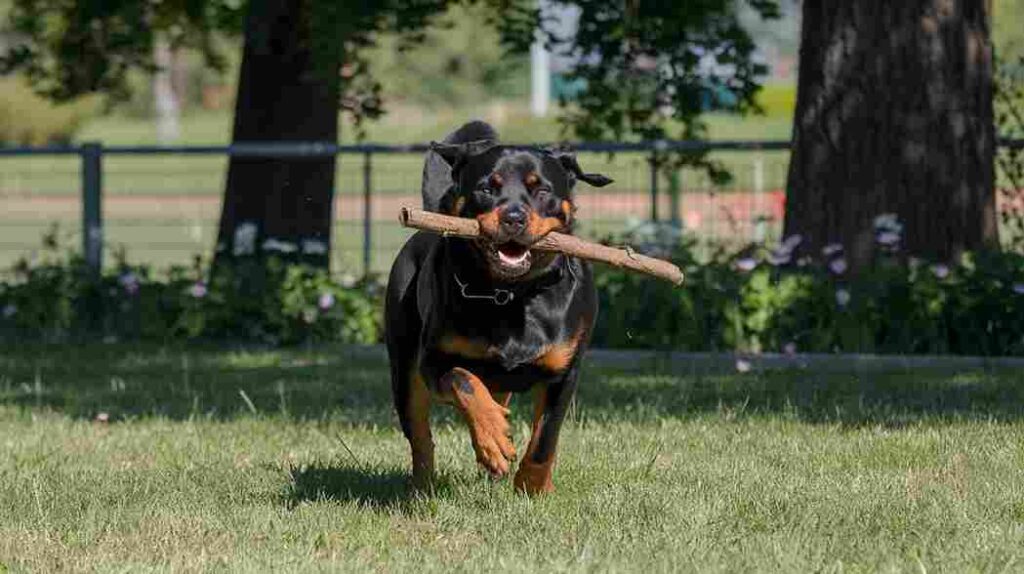
These dogs are bundles of energy, so get ready to get active! Daily walks, playtime, and interactive games are a must. Think frisbee, fetch, or even a fun agility course! They’ll love the challenge and the chance to burn off some steam.
Training is super important too. Start early and use positive reinforcement (think treats and praise!). They’re smart and eager to please, so training shouldn’t be too much of a headache. Enrolling in a puppy kindergarten class is a great way to start, and it’s a fun way to socialize your Rottie with other pups.
Pro tip: Rottweilers can be a bit stubborn sometimes (they’re independent thinkers!), so patience and consistency are key. But trust me, the effort is worth it when you have a well-behaved and obedient companion by your side.
Health: Keeping Your Rottie in Tip-Top Shape
Long-haired Rottweilers are generally healthy dogs, but like all breeds, they can have some health issues. Here are a few to keep an eye on:
Hip Dysplasia: A common problem in larger breeds where the hip joint doesn’t develop properly. This can lead to pain and mobility issues, but regular vet checkups and maintaining a healthy weight can help minimize the risk. (Source: Orthopedic Foundation for Animals)
Elbow Dysplasia: Similar to hip dysplasia, but affects the elbow joint.
Bloat: A serious condition where the stomach fills with gas and can twist, requiring immediate veterinary attention. To help prevent bloat, avoid feeding your Rottie large meals and discourage them from exercising vigorously after eating. (Source: VCA Hospitals)
Eye Conditions: Progressive Retinal Atrophy (PRA) and cataracts are sometimes seen in Rottweilers. Regular eye exams can help detect these conditions early.
Keep your furry friend healthy with a balanced diet, regular exercise, and those all-important vet visits. Don’t skip those annual checkups! Prevention is always better than cure.
For a deeper dive into Rottweiler health, check out our Rottweiler Health 101: A Guide to Common Issues & Preventative Care
-
Did you know? Rottweilers were originally bred in Germany to herd cattle and pull carts. Their name even comes from the German town of Rottweil! So, those protective instincts are deeply ingrained in their DNA.
Life with a Long-Haired Rottweiler
- Cozy Corner: Set up a comfy bed, food and water bowls, and a designated space for your Rottie to call their own. This will help them feel secure and comfortable in their new environment.
- Toy Time: Stock up on toys! Rottweilers love to chew, play fetch, and engage in interactive games. Puzzle toys are a great way to keep them mentally stimulated.
- Training and Socialization: Start training and socialization right away. Enroll in a puppy kindergarten class, introduce your Rottie to different people, places, and experiences, and be patient and consistent with your training. Positive reinforcement is the way to go!
- Love and Affection: Shower your Rottie with love and affection! These dogs thrive on human interaction and need to feel like part of the family. Cuddles, playtime, and quality time together will strengthen your bond and create a happy and fulfilling life for both of you.
- Active Lifestyle: These dogs are energetic and need space to run and play. If you live in a tiny apartment with no yard, a Rottie might not be the best choice unless you’re committed to taking them on multiple adventures every day. A fenced yard is ideal, giving them a safe space to zoom around and burn off energy.
- Family Life: Long-haired Rottweilers can be fantastic family dogs. They’re typically gentle and patient with children, but supervision is always needed, especially with young kids. Teach your children how to interact with dogs respectfully – no pulling tails or climbing on them! Remember, even the gentlest dog has its limits.
- Commitment: Rottweilers need training, exercise, and attention. They thrive on human interaction and need to feel like part of the family. Are you ready to make that commitment for the next 10-12 years? Bringing a dog into your life is a big responsibility, so make sure you’re ready for the long haul.
-
Remember: Bringing a dog into your home is a big commitment, but with love, patience, and consistent care, your long-haired Rottweiler will reward you with years of unconditional love and companionship.
Is This the Right Breed for You?

Okay, so you’re probably head over heels for these fluffy guardians by now. But before you rush out to find a breeder, let’s do a quick reality check. Long-haired Rottweilers are amazing dogs, but they’re not the right fit for everyone. Here are a few things to consider:
Creating a Happy Home
Congratulations! You’ve decided a long-haired Rottweiler is the perfect addition to your family. Now it’s time to roll out the red carpet and make your new furry friend feel welcome.
Comparing Long-Haired Rottweilers to Other Breeds
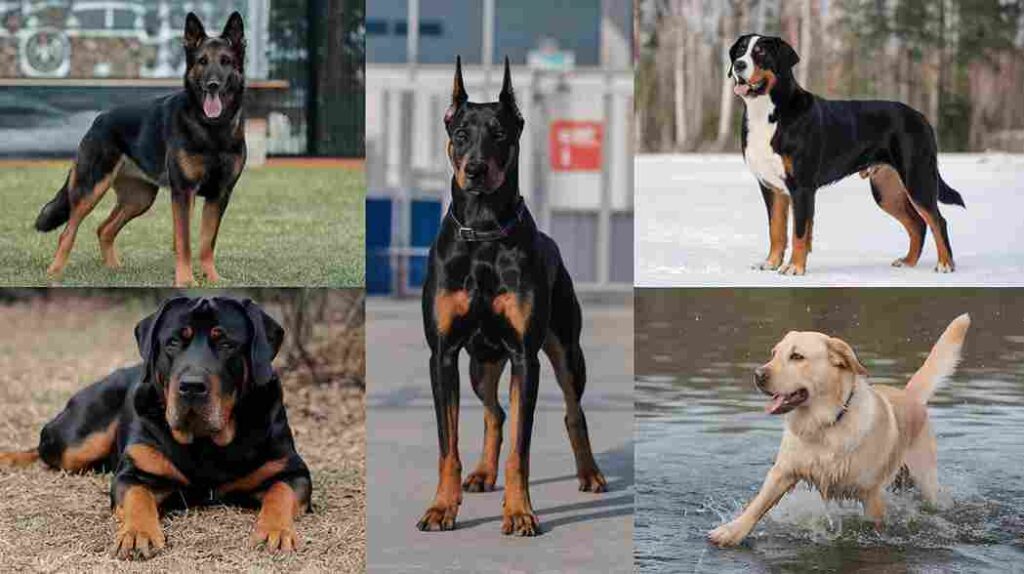
So, you’re convinced that a long-haired Rottweiler is the dog of your dreams (and who could blame you?!). But maybe you’re still curious about other breeds that share similar traits. Let’s do a little dog breed comparison shopping!
Similar Breeds:
- German Shepherd: Both are intelligent, loyal, and protective – the ultimate trifecta! German Shepherds often work in roles like police dogs or search and rescue, while Rottweilers can be both companions and working dogs. They both have thick coats that need regular grooming, so get ready to be best friends with your brush!
- Doberman Pinscher: Sleek and athletic, Dobermans are also intelligent and protective. Both breeds need early socialization and training to ensure they grow into well-mannered companions. Dobermans are known for their alertness and guarding instincts – they’re like the neighborhood watch of the dog world!
- Mastiff: Gentle giants that need early socialization to prevent any fear-based aggression. Mastiffs are typically more laid-back than Rottweilers, so if you’re looking for a dog that’s happy to cuddle on the couch all day, a Mastiff might be a good choice.
- Bernese Mountain Dog: Large and fluffy, these dogs have a friendly disposition and need lots of grooming, just like long-haired Rottweilers. Bernese Mountain Dogs are known for their calm demeanor and love of their families. They’re basically big, fluffy lovebugs!
- Labrador Retriever: Friendly and playful, Labs are generally less demanding in terms of exercise compared to Rottweilers. Labs are often used as service dogs and therapy dogs because of their gentle nature and eagerness to please.
-
Fun Fact Did you know that long-haired Rottweilers were actually more common in the early days of the breed? The short-haired variety we see most often today became more popular later on! So, in a way, owning a long-haired Rottie is like having a little piece of Rottweiler history. You're basically a canine historian!
Ready to Welcome a Long-Haired Rottweiler into Your Life?
We hope this guide has given you a good overview of these amazing dogs. If you’re looking for a loyal, loving, and fluffy companion, a long-haired Rottweiler might be the perfect fit for you. Just remember to do your research, find a reputable breeder or rescue organization, and be prepared to give your new furry friend the love, care, and attention they deserve.
FAQs about Long-Haired Rottweilers:
1. Are long-haired Rottweilers recognized by the AKC?
No, the AKC breed standard only recognizes the short-haired variety. However, this doesn't mean long-haired Rottweilers aren't purebred. They simply carry a recessive gene that results in a longer coat.
2. Are long-haired Rottweilers more aggressive than short-haired Rottweilers?
No, there's no evidence to suggest that long-haired Rottweilers are more aggressive. Temperament is influenced by factors like genetics, socialization, and training, not coat length. With proper socialization and training, both varieties can be loving and well-behaved companions.
3. Do long-haired Rottweilers shed a lot?
Yes, they do shed, even with regular brushing. Their long coat requires more frequent grooming to manage shedding and prevent mats. Be prepared to vacuum regularly!
4. Where can I find a reputable breeder of long-haired Rottweilers?
Finding a reputable breeder can be challenging, as long-haired Rottweilers are less common. Start by contacting breed clubs like the American Rottweiler Club for breeder referrals. You can also search online directories and attend dog shows to meet breeders in person. Make sure to ask about health testing and socialization practices to ensure you're getting a healthy and well-adjusted puppy.
Curious to learn more about the fascinating history of Rottweilers, including where that long-haired gene might have come from? Dive deeper into the breed’s origins and evolution in our comprehensive guide, 101 Amazing Rottweiler Breed Facts: History, Temperament & Care. You’ll uncover fascinating insights into their ancestry, working roles, and how they became the beloved companions we know today.


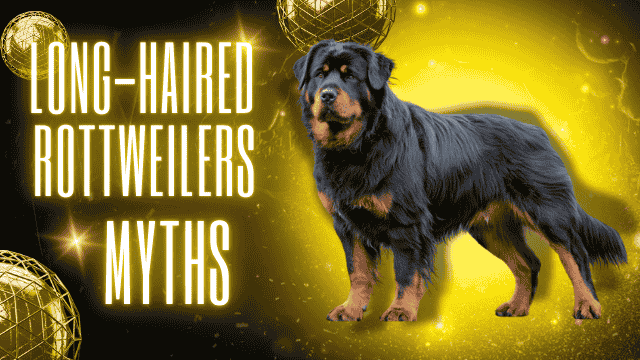


![Read more about the article Rottweiler Clipped Ears: Safe or Cruel? The Ultimate Guide [2024 Update]](https://rottweilerpaw.com/wp-content/uploads/2024/10/Rottweiler-Clipped-Ears-Safe-or-Cruel-The-Ultimate-Guide-2024-Update-300x169.png)

